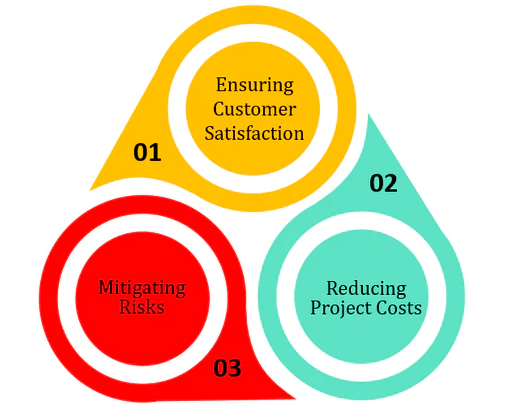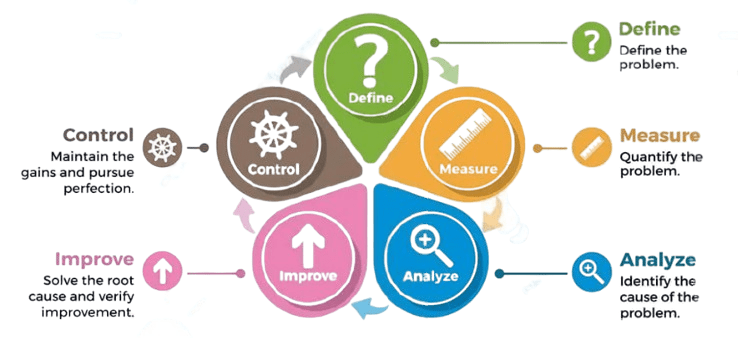
- Introduction to Minitab Data
- Impact on Quality Management with Minitab Data
- Six Sigma Principles
- DMAIC Methodology
- Minitab Data Tools and Techniques
- Integration of Lean Six Sigma
- Advantages of Minitab Data
- Industry Applications of Minitab Data
Introduction to Minitab Data
Minitab is a powerful statistical software used to analyze data, perform quality improvement processes, and support decision-making in various industries. It is particularly popular in Six Sigma and Lean methodologies for data analysis and process optimization. Minitab Data allows users to perform a wide range of statistical analyses, including hypothesis testing, regression analysis, control charts, and process capability studies. It is designed to make complex data analysis more accessible, even for users with limited statistical knowledge. The software provides various tools for data visualization, such as histograms, box plots, and scatter plots, enabling users to easily interpret data patterns and trends, especially with the skills gained through Data Science Training. Minitab’s integration with Six Sigma tools like Design of Experiments (DOE) and Capability Analysis helps organizations optimize their processes and improve product quality. Additionally, Minitab’s data manipulation features, such as sorting, filtering, and creating custom calculations, make it easier to clean and prepare data for analysis. With its user-friendly interface and extensive statistical capabilities, Minitab Data is a valuable tool for organizations looking to make data-driven decisions and achieve continuous improvement in their operations.
Do You Want to Learn More About Data Scientists? Get Info From Our Data Science Course Training Today!
Impact on Quality Management with Minitab Data
Minitab Data plays a critical role in quality management by enabling data-driven decision-making, streamlining processes, and enhancing consistency while minimizing errors. Minitab provides a structured approach to analyze data, identify root causes of defects, and implement sustainable solutions to prevent recurrence. By leveraging Minitab’s statistical tools, organizations can improve process efficiency, reduce waste, increase productivity, and achieve significant cost savings, much like Creating TV Hits Using Data Insights and Analytics to optimize content creation. One of the major advantages of Minitab Data is its ability to support decision-making through statistical analysis, providing factual evidence that reduces assumptions and errors, ultimately improving customer satisfaction.

Minitab’s flexibility makes it applicable across various industries such as manufacturing, healthcare, IT, finance, and logistics. These sectors use Minitab to meet stringent quality standards, ensure compliance, and drive operational excellence. By supporting continuous improvement and efficiency, Minitab helps organizations maintain a competitive edge and consistently deliver high-quality products and services.
Six Sigma Principles
- Data-Driven Decision-Making: Minitab’s data analysis capabilities ensure decisions are based on solid quantitative data, improving outcomes and facilitating informed choices.
- Continuous Improvement: Minitab aids in iterative optimization by analyzing data to find inefficiencies, enabling continuous process enhancement.
- Process Standardization: By visualizing process performance through Minitab, companies can standardize their operations, reducing variations and ensuring repeatable results.
- Employee Involvement: Minitab’s tools encourage team collaboration, providing actionable insights that align with Project Manager Roles for successful project execution.
- Sustainable Results: Minitab helps implement long-term improvements by analyzing trends and sustaining process optimizations based on data.
- Cross-Functional Collaboration: Minitab’s comprehensive data analysis features enable collaboration across departments, ensuring a unified approach to process improvements.
- Problem-Solving Focus: Minitab’s analytical tools, such as regression analysis and control charts, target the root causes of problems, ensuring that issues are resolved at their source.
- Customer-Centric Approach: Minitab Data enables organizations to understand customer needs and ensure consistent, high-quality products or services that meet or exceed expectations.
- Define: Minitab helps in clearly defining problems and objectives by quantifying key metrics such as defects per unit (DPU) or process capability.
- Measure: Minitab’s data collection and analysis features help gather and measure performance, providing a solid baseline for the project.
- Analyze: Minitab uses tools like Pareto charts and regression analysis to identify defects, much like the Planning Poker Tool helps assess task complexities.
- Improve: The improvement phase benefits from Minitab’s simulations, data validation, and optimization tools to implement and test solutions effectively.
- Control: Minitab’s control charts and monitoring tools help sustain improvements by ensuring that the process remains stable and within acceptable limits.
- Sustain: Minitab helps organizations track long-term performance, ensuring the sustainability of improvements by embedding successful strategies into organizational processes.
- Standardize: Minitab aids in standardizing processes by providing statistical validation, ensuring that improvements are consistently applied across the organization.
- Process Optimization: Minitab combines Lean and Six Sigma principles, optimizing processes by addressing inefficiencies and reducing defects with data-driven insights.
- Customer Focus: Minitab’s data analytics enhances customer satisfaction by ensuring high-quality, defect-free products and services.
- Data-Driven Decisions: Minitab supports Lean Six Sigma’s data-driven decision-making, providing tools to measure performance and identify areas for improvement.
- Continuous Improvement: Minitab helps foster a culture of continuous improvement, allowing ongoing optimization and waste elimination.
- Standardization: Minitab’s tools standardize processes, ensuring consistency key for understanding How to Become a Sales Manager through optimized decision-making.
- Employee Involvement: Minitab encourages collaboration and engagement across departments by providing actionable insights.
- Sustainability: Minitab supports the sustainability of Lean Six Sigma improvements by tracking long-term performance and embedding solutions into organizational culture.
Would You Like to Know More About Data Science? Sign Up For Our Data Science Course Training Now!
DMAIC Methodology

Minitab Data Tools and Techniques
Minitab offers a wide range of tools that are integral to implementing Six Sigma methodologies effectively. One of its key features is the Pareto Chart, which helps identify the most significant causes of defects by focusing on the “vital few” issues that require immediate attention. Minitab also enables the creation of the Fishbone Diagram (Ishikawa), which visually maps out potential causes of a problem, supporting thorough root cause analysis. Its Control Charts are essential for tracking process performance over time, helping ensure that variations remain within acceptable limits and processes stay stable. In addition, Minitab supports Failure Mode and Effects Analysis (FMEA), a tool used to evaluate potential failures and their impacts, so that appropriate corrective actions can be prioritized, especially when combined with Data Science Training for deeper insights. The Histogram feature helps visualize data distribution to identify patterns and deviations clearly. With Statistical Process Control (SPC) tools, users can monitor and control processes using real-time data, ensuring consistent quality. Minitab also facilitates 5 Whys Analysis by structuring data to identify root causes systematically. Finally, it supports Process Mapping, enabling users to visualize workflows and pinpoint inefficiencies. Collectively, these tools make Minitab a powerful platform for driving continuous improvement through Six Sigma.
Looking to Master Data Science? Discover the Data Science Masters Course Available at ACTE Now!
Integration of Lean Six Sigma
Advantages of Minitab Data
Minitab plays a vital role in enhancing quality management by offering powerful statistical tools that lead to significant organizational benefits. One of the key advantages is better quality, as Minitab helps reduce defects, errors, and process variability, resulting in high-quality products and services. This consistent quality directly contributes to increased customer satisfaction, as Minitab’s analysis tools ensure customer expectations are met, improving loyalty and retention. Additionally, the software contributes to cost reduction by identifying defects early and streamlining processes, which minimizes waste and unnecessary expenditures. Minitab also boosts efficiency by helping organizations eliminate non-value-added activities, improving workflow and overall productivity, similar to how Top Programming Languages for Data Science enhance data-driven decision-making. Its emphasis on data-driven decision-making allows teams to base their strategies on factual, statistical evidence rather than intuition, increasing the reliability of outcomes. Moreover, using Minitab gives companies a competitive advantage, enhancing their reputation for quality management and process excellence. Finally, Minitab encourages employee engagement by involving team members in data analysis and improvement initiatives, fostering collaboration, ownership, and a culture of continuous improvement. These collective benefits make Minitab an essential tool for any organization aiming to achieve operational excellence through Six Sigma practices.
Want to Learn About Data Science? Explore Our Data Science Interview Questions & Answer Featuring the Most Frequently Asked Questions in Job Interviews.
Industry Applications of Minitab Data
Minitab Data is extensively utilized across a wide range of industries to drive process improvement and operational excellence. In manufacturing, Minitab is instrumental in eliminating defects, optimizing production workflows, and enhancing overall product quality. Within the healthcare sector, it supports initiatives to improve patient safety, reduce clinical errors, and streamline administrative and treatment processes. In finance and banking, Minitab ensures greater transaction accuracy, minimizes processing errors, and boosts customer satisfaction by improving service reliability, especially with the insights gained through Data Science Training. In the IT and software industry, Minitab contributes to higher development quality by reducing software bugs, enhancing testing procedures, and accelerating deployment times. The logistics and supply chain sector leverages Minitab to improve inventory control, reduce delays, and increase delivery precision. Meanwhile, in retail, the software is used to optimize store operations, improve inventory turnover, and elevate customer service standards. Across all these sectors, Minitab empowers organizations to make data-driven decisions, minimize waste, and foster a culture of continuous improvement. As a result, companies can enhance performance, achieve regulatory compliance, and deliver higher levels of customer satisfaction, ultimately supporting long-term success and competitive advantage.


